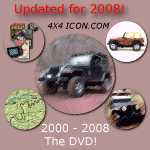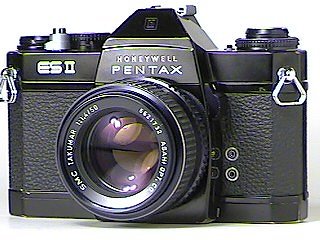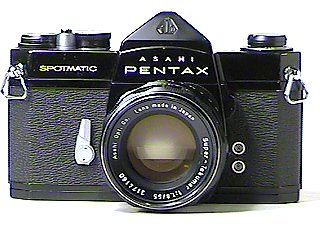JVC GR-AXM700U

March 2001 - May 2003
Pictures on this site
were made with the following cameras: |
Period
|
Camera Make/Model
|
|
October 2009 - Present
- |
|

|
|
November 2008 -
September 2009 -
|
|

|
|
May 2003 - November
2008 - |
|

|
|
March 2001 - May 2003 -
|
|

|
|
|

|
|
|

|
|
|

|
|
|

|

4X4 ICON 2000 - 2008 The DVD!
Photo Gear
One piece of gear that I
always bring with me is a camera. For quite some time I have always brought one 35mm
or another, and also my JVC video camera. I like good cameras and so it's always a
balance between risk of camera damage and good pictures. So far I have been lucky -
no cameras have been injured in the making of the trip reports! No matter what the
type, I recommend bringing a camera with you on the trail, even if it is a throw-away
model.
I have been involved in
photography since I was a kid. I started with clones of Kodak Instamatics. My
Dad has an Argus C-3 that always fascinated me.

He made super pictures with
it and I knew that one day I would get myself a 35mm. The time came when I had a
reason: I got myself assigned as the yearbook photographer for my high school
class. My friend in the class ahead of me had an Asahi Pentax Spotmatic that his
brother bought for him while overseas.
 
He brainwashed me into
thinking it was the only 35mm camera worth owning. Short of hardcore scientific
work, or heavy-duty expedition shooting, it remains a standard by which others are
compared. Until recently, I have concentrated my entire 35mm system around the
Spotmatic family of cameras. I have never been disappointed with the results they
produce and the Super-Multi-Coated Takumar lenses made by Asahi Optical Company in Japan
are outstanding. I use other cameras with larger film sizes, but for my trips with
the Jeep, the small cameras remain the tool of choice.
Be that as it may, most of
my trip reports were fairly major productions. I would have to supply myself with
film prior to the trip. Then I would be loading the camera in the woods, usually
once or twice, depending on the day. Then when we returned from the trip, I would
bring the film to be processed. When it came back, I would then have to scan all the
images, three at a time, crop, adjust and save them to disk. Then do the web page
stuff. It could take two days worth of work just to get the photos done.
Meanwhile I saw people whipping out their digital cameras and posting their pictures a few
minutes after they got home. In many cases, the image quality produced by the
cameras was inferior, but just the ability to get the pictures up was very
attractive to me.
I started using our JVC
video camera to shoot limited digital images.

It has the ability to shoot
and store up to 20 - 320 x 240 digital images. In some cases, these images were
sufficient to document out trips. But like other low-end digital cameras, the
picture quality was not up to my standards. I used it, but I wanted something
better.
Digital images are made with a
JVC GR AXM 700 video
camera. This camera is capable of shooting regular video on VHSC tapes and also of storing
up to 44 images to built-in flash-memory. In high quality mode, up to 22 images are
stored.
These images are shot in high quality (fine) mode. The White Balance is manually set to
the white background. This was done to improve the color accuracy. The exposure was set to
+2 (in a range of 12 relative settings, from 6 increments underexposed to 6 increments
over exposed). The camera is set to Macro-Zoom, Autofocus mode to allow the closest
possible shot. The camera is placed on a tripod to eliminate camera shake. The image
size is 320 x 240.
The camera does an adequate job of recording images. There is no doubt that something like
the Olympus D-320L does a much better job of producing high quality images. This camera
does not render reds very well. The image size in high-quality mode is only 320x240, which
is pretty small. The built-in light is useless for taking pictures like this. The software
that comes with the camera is extremely basic and reads like a badly translated
instruction manual. Unlike the Olympus software, it does not load the image to an image
editor before storing so images lose something right away because they are stored in a
JPEG format, which is very "lossy". One nice feature that the software does
provide is the ability to send images back to the camera for use in titling etc. That
accounts for the incredibly good sample images that come with the camera....
As a video camera for home use it is pretty nice. I got it as a gift so I cannot be too
crabby about it. I would prefer full VHS sized tape and a longer battery life, but it
serves it's intended purpose - to record the early life and times of our young son. And
the still camera feature is a nice extra if you can't afford both a digital camera and a
video camera.
The flexibility of settings is incredible. I do not recommend this camera to anyone who
has trouble setting the time on their VCR! But you can manage most settings manually as
well as automatically, perform several useful special effects, low light shooting,
titling, and even automated editing with a compatible VCR. The camera has inputs and
outputs of every possible kind.
Anyway, that is my "professional" opinion of the camera. I hope you like the
Photo Album
Features and Specifications

Manual
- Integrated Digital
Still Camera
- 44X Variable Speed
Digital Hyper Zoom
- 110,000 pixel 3.0"
high resolution 270 degree rotating LCD
Color monitor
- Electronic
viewfinder with black/white 0.5" CRT
- 5 Video Head VHS-C
system
- Digital Image
Stabilizer
- 1/4" format CCD
- 22X Optical Zoom
- Super LoLux boosts
low light sensitivity to less than 1 lux
- Full-function
Remote Control
- Snapshot mode
- Program AE with
Special effects
- Title Generator
features 8 preset messages in English,
Spanish, French and Portuguese
- Wide Mode
- Tele-Macro
- Manual focus and
Exposure modes
- Animation and Time
Lapse
- Quick review and
retake function
- Black fader
- Digital Wipes and
Fades
- Compact Battery
Pack - BN-V11U
- Multi-voltage AC
Power Adapter/battery charger with built-in
battery refresher
- PC Connection
Cables for PC/AT compatible computers &
Macintosh
- CDROM
Software:Picture Navigator & PhotoSuite
- Shoulder Strap,
Compact VHS cassette playpak
- F1.6 Wide-Angle
lens
- Built in Auto Light
- AV output (monoral
audio)
- 1 year parts, 90
days labor warranty
- Shipping Weight
5.25 lbs
- Power 6V DC
|
|
|
Some up-to-date choices:
Recommended Starter Items for Canon PowerShot
xxx
Starter Accessories
Return to Jeep Specs | Modification Schedule
Shop for
Jeep Toys and Books | See the
Toy Jeeps | Off-Road Index
Photos (except as
noted), Layout and Design © 2004 Paul M.
Provencher All Rights Reserved.
Contents of this Web Site may not be used without written permission
 Visitors since 2/25/04
Visitors since 2/25/04
Home


Visitors since 2/25/04